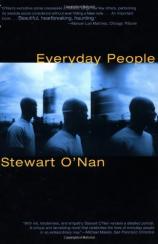Everyday People
Review
Everyday People
Stewart O'Nan's latest novel could likely take place anywhere, but
it's absolutely right that it takes place in Pittsburgh,
Pennsylvania. Filled with local dialect, or "Pittsburghese" (like
the term chip-chop ham), and with fathers working for the biggest
of the local corporations such as Nabisco, this book is Pittsburgh
through and through. The geography is impeccable; there is a
passage where a character drives a stolen car around town that is
so perfect, I could swear I was in the car. Mr. O'Nan even flavors
the tale with real Pittsburgh weather --- everything gray, always
raining.Over
the course of one week in the fall of 1998, East Liberty, a
community in Pittsburgh, is on the verge of being cut off from the
rest of the city by the opening of a new expressway for buses. The
town has long been victim to poverty and gang violence; during this
one week, their patience will be tested more than usual.The
youngest child of the Tolbert family, Chris, a.k.a. Crest, has
recently been in a horrible accident on that very expressway which
left him paralyzed from the waist down. The accident also took the
life of his best friend. His girlfriend and mother of his son,
Vanessa, is going to school to improve her chances in life; his
brother has recently returned from jail a born-again Christian, and
the marriage of his parents is in crisis. Beside this one family,
there are neighbors dying, friends being robbed, and political
upheaval.The
novel is very nonjudgmental. These characters are who they are.
They are parents, drug lords, homosexuals, politicians. They each
speak in very distinctive voices, never losing the slang of the
inner city. The dialect is near perfect.O'Nan uses a very effective form, telling the story of
different characters in separate chapters. Each character has his
or her place, and because of the way the chapters are broken up,
the novel is a quick and ever-changing read. This form fits
perfectly the pace of life for these characters, and is benefited
by the strong voices of each character.From
the beginning quote by Raymond Patterson, one understands that this
is a novel not only about the plight of the black man in the city,
but of how the city can benefit from, or harm, its urban residents.
It shows in a powerful way how society keeps going in circles, and
how we often wonder how to get out of the pattern. One character,
while reflecting upon life in East Liberty, thinks that "there
wasn't a day he didn't wonder what exactly he was doing there."
This might well be the thought heard round the world. Haven't we
all thought of ways to get out of a bad situation? And haven't many
just stayed for reasons unknown?I
began reading this novel believing that it would focus primarily on
Crest; by the end, I felt it focused more on Vanessa. Though the
other characters are equally strong in voice and story, Vanessa and
her new life as a result of night school occupy the most chapters.
And while she begins this novel with a slightly soft tone and a new
wide-eyed view of the world, she ends it with an attitude that
comes off as a bit "holier-than-thou." I would have liked to have
spent more time inside the head of Crest. The final chapters where
he attends the opening of the busway where he had his accident are
powerful and moving. They ring the truest of all of the well-titled
chapters.After reading Stewart O'Nan's novel, readers will be more than
familiar with the workings of life in urban America. If they have
never been to Pittsburgh, they will feel as if they have been, and
if they have been, they will receive a very welcome return trip.
They will listen to the voices of these characters, and they will
know them to be everyday people, rather than hooligans, or drug
lords, or thieves. And they will go out singing "O Happy
Day."Special Note: The last sentence sent chills right through me.
Definitely worth the careful reading to feel the power of that
sentence.
Reviewed by Josette Kurey on January 21, 2011
Everyday People
- Publication Date: April 5, 2002
- Genres: Fiction
- Paperback: 304 pages
- Publisher: Grove Press
- ISBN-10: 0802138837
- ISBN-13: 9780802138835





